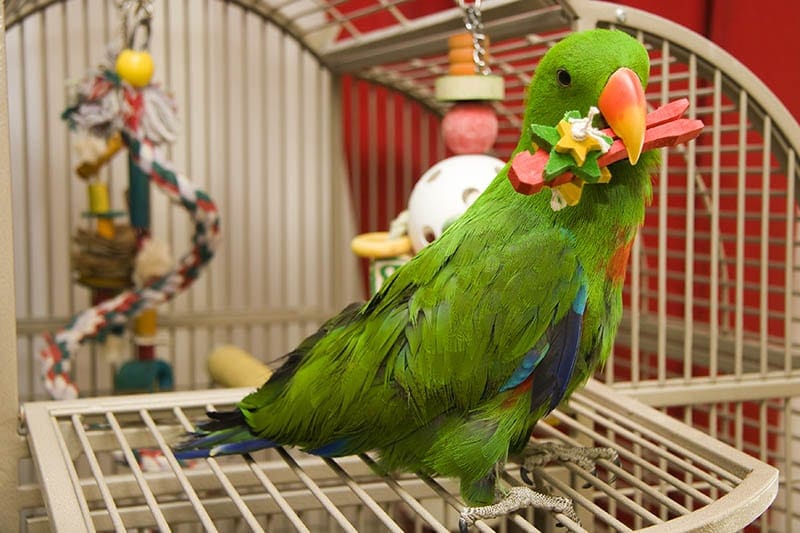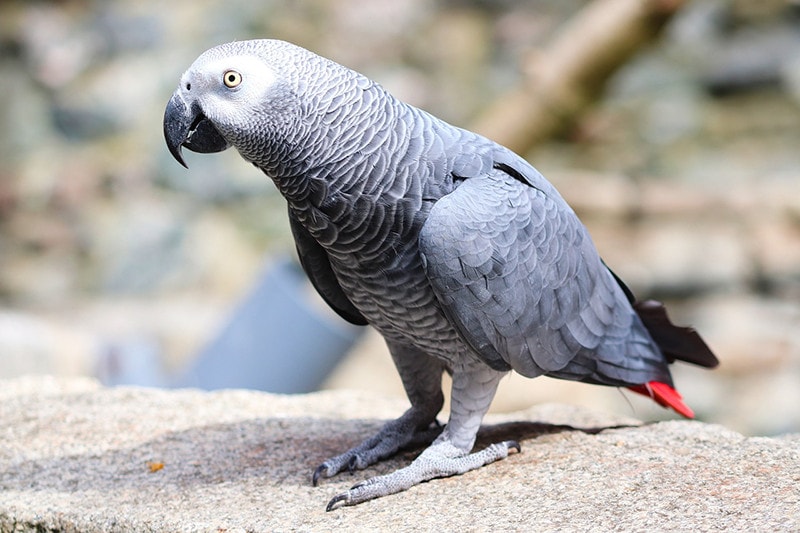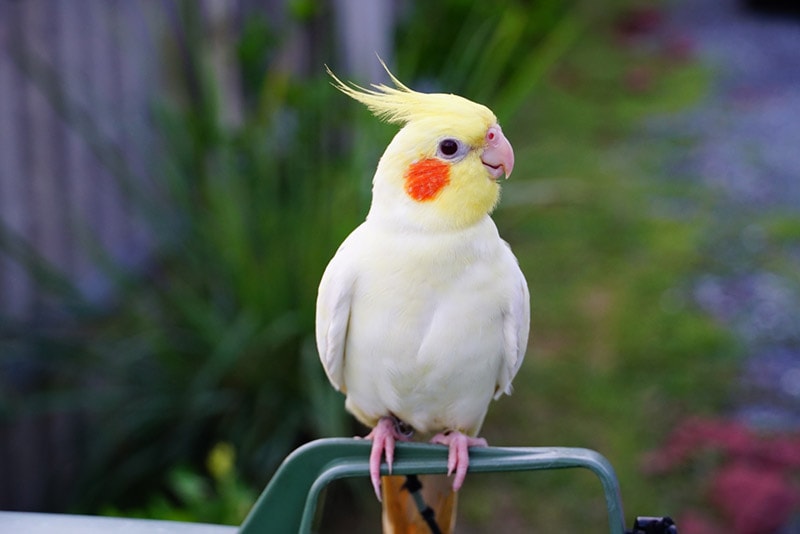Can Parrots Eat Raisins? Vet-Approved Facts & FAQ
Updated on
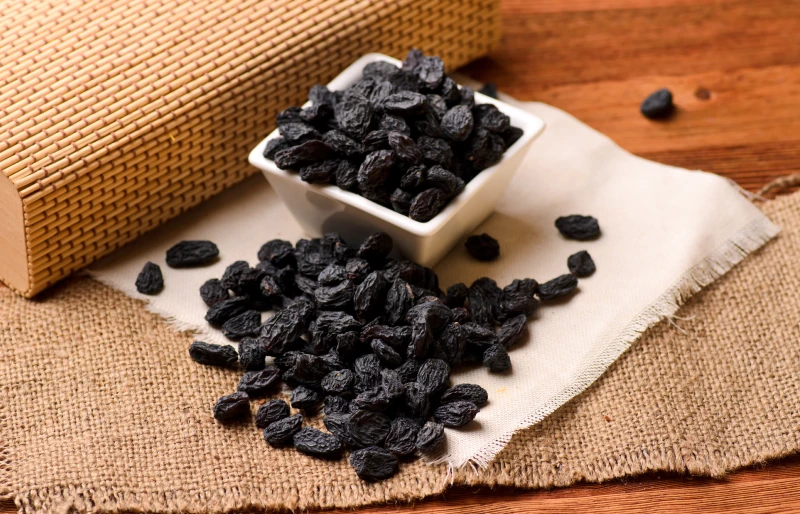
Click to Skip Ahead
Parrots are interesting and lovable pets that require a lot of attention and dedication from their owners to make sure they stay safe and healthy throughout their lives, which are often decades long! They need a clean, safe habitat to spend their time in, toys and interactive items to keep them occupied, personal interaction with their human companions to keep them happy, and a nutritional diet to keep them healthy. Snacks and treats are always fun to provide to a parrot, but not all foods are created equal when it comes to supporting your pet’s health.
Many parrot owners wonder about raisins. You may know that raisins and grapes are toxic for cats and dogs, but can parrots eat them? Yes! Parrots can eat raisins, and they can be great additions to their overall diet. Most parrots enjoy eating these dried fruits, so they can be great for training and bonding. Here’s everything that you should know about feeding raisins to your pet parrot.
What Exactly Are Raisins?
Raisins are dried grapes. They come in both red and green varieties, but the red ones are the most common. Grapes are made up of about 80% water, so it takes a while for them to dry out. If you were to dry grapes into raisins at home, it can take up to about 4 days, depending on the technique you’re using (sun, oven, dehydrator, etc.). Commercial raisins can take weeks to produce. Homemade raisins are typically plumper, moister, and more flavorful than commercially produced raisins. Some commercial raisins have added sugar, even though they are naturally sweet as is. If added sugar is necessary, the raisins are likely not made from quality grapes.
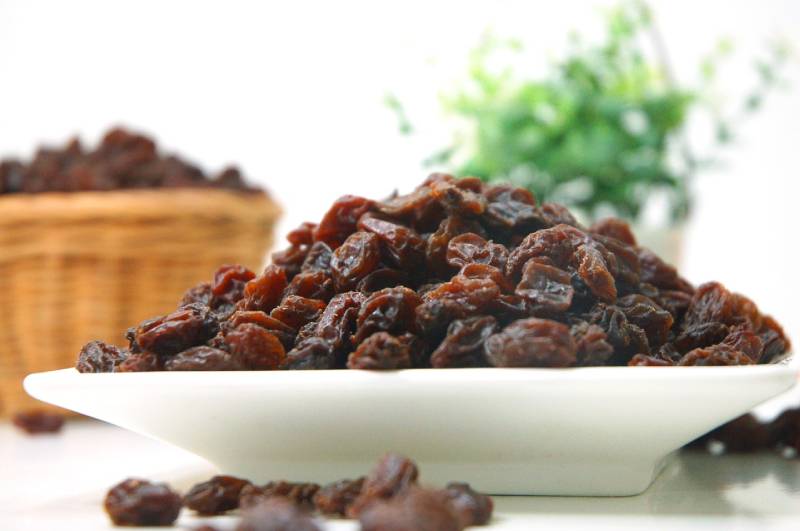
Do Raisins Offer Any Health Benefits to Parrots?
Raisins are soft, easy to eat, and tasty due to their sweetness. Parrots can detect sweetness, saltiness, bitterness, and sourness as a way to determine which foods are safe and unsafe to eat in the wild. When they taste something bitter, they know that the food could be dangerous. When they taste something sweet, they know that it’s a safe food, so they go for it!
When they taste a raisin, they know that they’re safe eating it. There are a few health benefits that raisins have to offer when it comes to parrots eating them as snacks:
| Potassium | It helps keep blood pressure in check and reduces the risk of stroke as a parrot ages. |
| Vitamin B | It helps support a healthy immune system and brain function. |
| Iron | Vital for red blood cell function. |
| Antioxidants | These help fight cell damage. |
| Fiber | It helps maintain digestive system health. |
Cautions to Consider When Feeding Raisins to Your Parrot
There are a few cautions that every parrot owner should be aware of when it comes to feeding raisins to their pets as snacks or treats.
- Raisins contain a high amount of sugar, which can lead to hyperactivity, and that can be a problem for birds spending their time in a cage without the opportunity to exert that extra energy.
- The sugar in raisins can result in unnecessary weight gain. This can inhibit proper mobility and range of motion and can decrease your parrot’s lifespan.
- Choking is a potential hazard when feeding raisins to parrots. If it seems as though your parrot has a tough time eating a whole raisin, try breaking it into two or three pieces and feeding it to them that way.

Frequently Asked Questions (FAQ)
What’s The Difference Between Raisins, Sultanas, and Currants?
Raisins, Currants, and Sultanas are all variations of dried grapes. Sultanas and raisins are virtually the same, the only difference being their color. Raisins are the more traditional dark brown, whereas sultanas are lighter in color, sometimes referred to as golden raisins. Currants, on the other hand, are the dehydrated form of the Black Corinth grape. They are dark red in color, are smaller and firmer than sultanas and raisins, and have a slightly more tangy flavor. All are safe for parrots, but they might prefer the sweeter versions over the currant.
How Often Can My Parrot Eat Raisins?
Raisins should be considered an occasional treat or snack for your pet parrot, as they don’t contain all the nutrients that a parrot needs for good health throughout their lives. Granted, they do offer a few nutritional benefits, but they aren’t crucial to the parrot’s diet. Offer a few raisins a week during training or while socializing, and your parrot should be quite satisfied.

What Exactly Should Parrots Eat?
There are a few different things that a parrot should regularly eat to ensure that all their nutritional needs are taken care of. Board-certified avian vets recommend that 50% to 70% of a parrot’s diet be made up of commercial pellets made specifically for your parrot species, without fillers or additives like dyes. Different parrots need different diets, so it is vital that you are offering them the right types of food.
- Peas
- Bean sprouts
- Zucchini
- Green beans
- Beets
- Tomatoes
- Kale
- Spinach
- Chard
- Parsley
- Carrots
- Apples
- Bananas
- Berries
- Oranges
- Kiwi
- Brown rice
- Whole-grain bread
- Nuts
- Seeds
Again, the right balance and inclusions for your parrot will depend on their species. If you are unsure of what to feed your parrot, it is important to get guidance and recommendations from your veterinarian.
Conclusion
Parrots can enjoy raisins as a part of an overall healthy diet, but they should be considered snacks or treats. Both store-bought and homemade raisins can be offered to your pet parrot, but always check the ingredients for any sneaky additives. The commercial ones are more convenient but the homemade ones are tastier.
Featured Image Credit: Cheese78, Shutterstock



